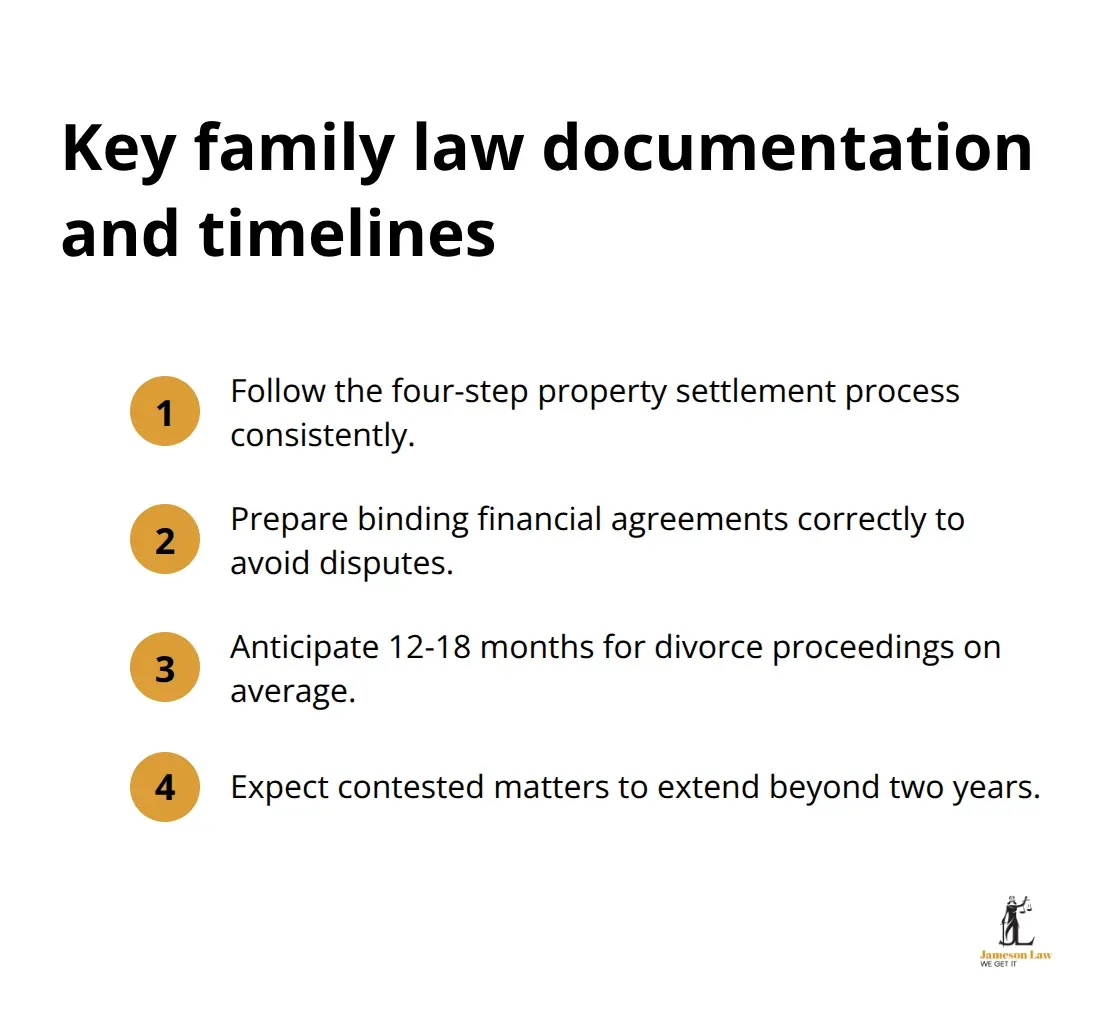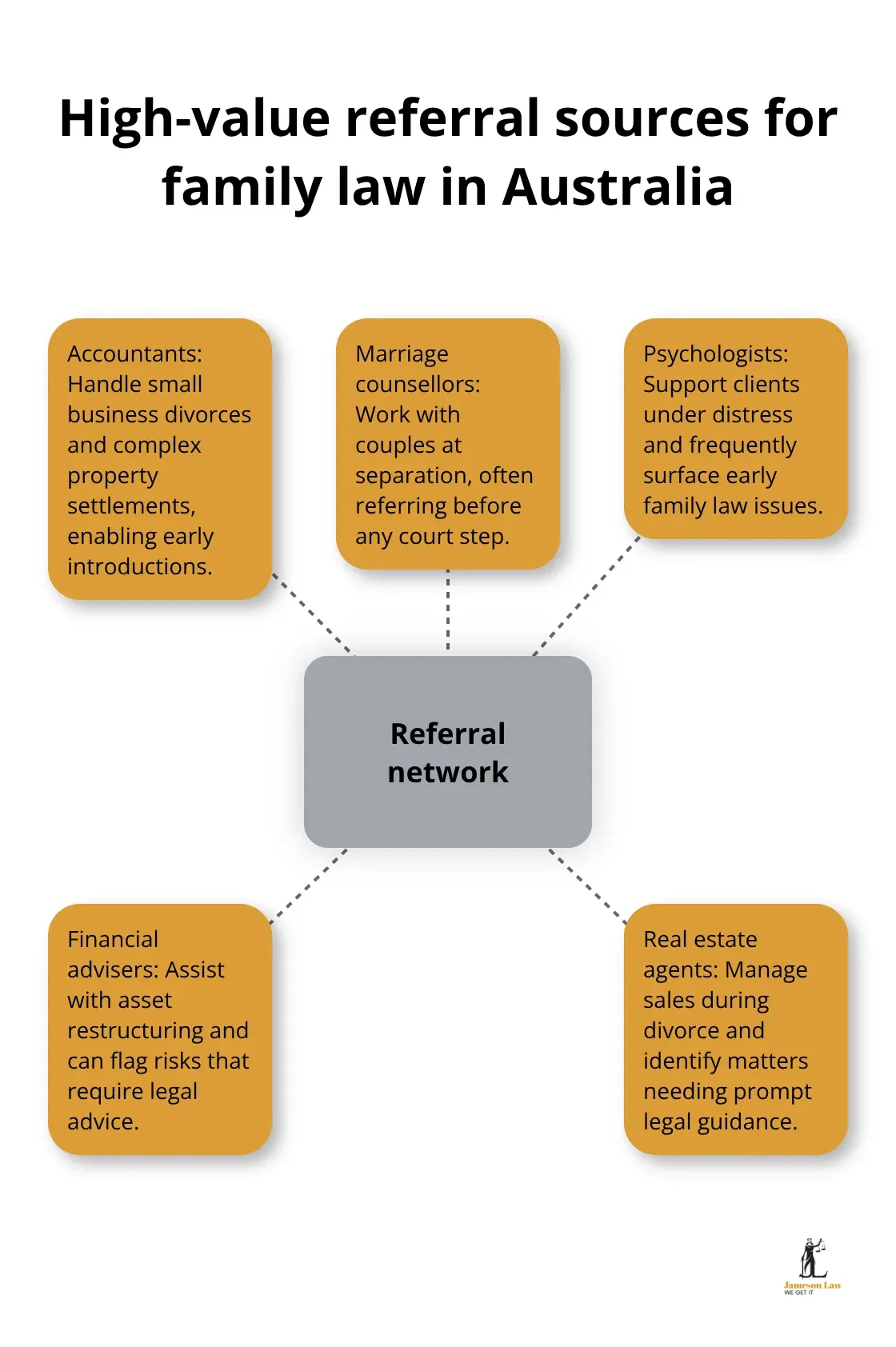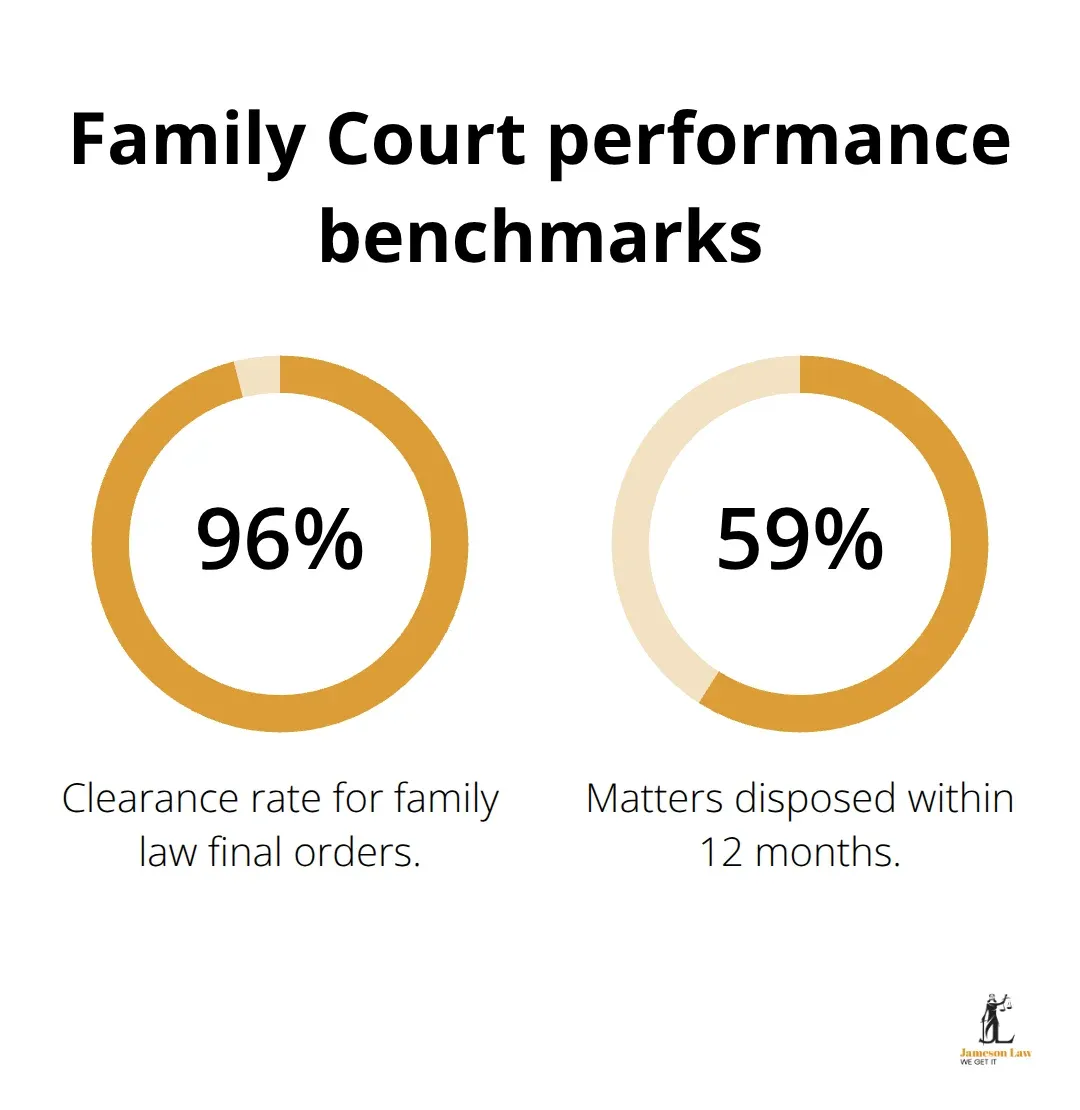Starting a successful family law practice requires more than just legal knowledge. The field demands exceptional interpersonal skills and strategic business planning.
We at Jameson Law, as expert family lawyers in Sydney, understand that practising family law means navigating emotionally charged situations while building a sustainable practice. This guide covers the essential steps to launch your family law career effectively.
Essential Skills and Qualifications for Family Law Practice
Practising family law in Australia demands specific educational requirements and admission to the legal profession. You must complete a bachelor’s degree in law or a Juris Doctor, followed by practical legal training through programs like the Graduate Diploma in Legal Practice. After admission to the Supreme Court in your state, you can practise family law immediately, though specialised knowledge remains essential for effective practice.
Master Client Communication Under Pressure
Family law clients experience extreme emotional distress, making effective communication crucial for successful practice. Develop active listening skills through specific training programs rather than assume natural ability. Use open-ended questions to understand client needs fully, and provide written advice at each stage to prevent misunderstandings. Always explain court processes like compulsory mediation in plain language, and avoid legal jargon that confuses clients during already stressful situations.
Understand Court Documentation Requirements
The Family Law Act 1975 governs all family proceedings and requires precise documentation standards. Master the four-step property settlement process and understand binding financial agreements to avoid costly litigation errors. Property settlements involve complex financial analysis, with the average Australian divorce case including superannuation and real estate assets subject to Capital Gains Tax considerations. File management becomes critical when you handle the 12-18 month average duration for divorce proceedings, while contested matters extend beyond two years.

Develop Systematic Case Management Approaches
Use litigation preparation checklists and develop systematic approaches to case management, as the Federal Circuit and Family Court processes thousands of applications annually that require meticulous attention to procedural requirements. Create efficient file handover processes and supervision systems that aid the management of concurrent trials (particularly important for junior lawyers). Implement practice tools developed by family law experts to streamline case management and legal procedures. These systems become essential when you consider that child custody (parenting arrangements) and support cases account for about 35% of family law work, each requiring high emotional intelligence and specific legal knowledge.
With these foundational skills and qualifications established, the next step involves building a sustainable client base that will support your family law practice’s growth and success.
Building Your Family Law Client Base
Successful family law practice requires aggressive networking and targeted marketing strategies that differentiate you from the thousands of family lawyers who practise across Australia. Australia’s legal profession is at an all-time high following a +45% increase in the past nine years in the total number of practising solicitors. Most new practitioners make the mistake of waiting for clients to find them, but successful family law practices in Sydney actively cultivate referral relationships and establish strong community presence within their first year of practice.
Target High-Value Referral Sources
Focus your networking efforts on professionals who regularly encounter family breakdowns rather than general legal networking events. Accountants handle many small business divorces and property settlements, which makes them valuable referral sources. Build relationships with marriage counsellors (like Relationships Australia), psychologists, and financial planners who work with separating couples, as these professionals often refer clients before court proceedings begin.

Real estate agents frequently encounter property sales during divorce proceedings and can provide consistent referrals. Schedule monthly coffee meetings with three new potential referral sources and maintain quarterly check-ins with existing contacts. Track referral sources meticulously, as a successful family lawyer in Sydney typically receives 60-70% of new clients through professional referrals rather than advertising.
Establish Community Authority Through Targeted Education
Position yourself as the local family law expert when you host monthly seminars at community centres on topics like property settlement basics and parenting arrangements. Partner with local libraries, community legal centres (like Legal Aid NSW), and women’s shelters to provide free legal information sessions, which generates significant word-of-mouth referrals.
Write weekly columns for local newspapers that focus on practical family law issues and avoid theoretical discussions that fail to engage readers. Create simple educational resources like property settlement checklists and parenting plan templates that demonstrate your expertise while providing immediate value.
Focus Your Marketing on Key Demographics
Target your marketing toward specific demographics who experience family breakdown, such as women aged 35-55 who initiate many divorce proceedings in Australia. The 2023 divorce rate is the lowest since the implementation of the Family Law Act 1975. Digital marketing should focus on local SEO optimisation and Google My Business management, as 85% of potential family law clients search for a solicitor in Sydney within 25 kilometres of their location (making local visibility essential for practice growth).
Develop content that addresses immediate client concerns rather than broad legal concepts. Create resources that potential clients can use immediately, such as separation checklists and co-parenting communication templates.
Once you establish a steady client base through these networking and marketing strategies, you must develop the skills to handle the complex cases that will define your reputation and determine your practice’s long-term success.
Managing Complex Family Law Cases
Complex family law cases demand strategic planning from day one rather than reactive responses to opposing counsel’s moves. High-conflict divorce and custody disputes typically involve clients with personality disorders or substance abuse issues, which makes traditional negotiation approaches ineffective. These cases require structured case management protocols that include detailed documentation of all client interactions and firm boundaries about communication frequency. The Federal Circuit and Family Court of Australia maintains a 96% clearance rate for family law final orders (based on annual reports), though only 59% are disposed within 12 months, which makes early intervention strategies essential for client satisfaction and cost management.

Apply Financial Forensics for Property Disputes
Property settlements that exceed $500,000 require forensic accounting expertise rather than basic asset division calculations. The average Australian divorce involves assets worth $650,000, which includes superannuation and real estate holdings that require professional valuations. Engage qualified business valuators within 30 days of receipt of financial disclosure, as property values can fluctuate significantly during extended proceedings. Self-managed superannuation funds (SMSF) and family trusts add complexity that demands specialised financial analysis (which makes early expert engagement non-negotiable for successful outcomes).
Coordinate Multi-Disciplinary Professional Teams
Complex cases require coordinated teams of psychologists, financial advisers, and child specialists rather than solo legal advocacy. Schedule monthly case conferences with all professionals involved, as fragmented communication leads to inconsistent advice and client confusion. Family consultants provide valuable expertise when engaged early in proceedings. Child psychologists provide court-admissible reports that carry more weight than parental testimony (which makes their involvement essential in contested custody matters that involve allegations of family violence (AVOs) or substance abuse).
Manage High-Conflict Client Communications
High-conflict clients often contact lawyers multiple times daily and create additional stress for legal teams. Establish clear communication protocols that limit client contact to scheduled appointments and emergency situations only. Document all client interactions in detailed file notes, as these clients frequently dispute previous conversations and advice provided. Set firm boundaries about after-hours contact and implement structured communication systems that reduce emotional escalation while maintaining professional relationships.
Final Thoughts
A successful family law practice requires systematic execution of three fundamental components: master essential skills, build a robust client base, and develop expertise in complex case management. The Australian legal profession’s 45% growth over nine years creates intense competition that makes strategic differentiation essential for new practitioners. Practising family law successfully demands continuous professional development beyond initial admission requirements.
The Federal Circuit and Family Court’s procedures evolve constantly, and regular amendments to the Family Law Act 1975 require ongoing education through accredited programs. Attend quarterly family law conferences and complete specialised training in areas like financial analysis and trauma-informed practice to maintain competitive advantage. Track referral sources meticulously, maintain quarterly check-ins with professional contacts, and document all client interactions comprehensively (as high-conflict cases that define practice reputation demand structured protocols from day one).
Technical legal expertise combined with exceptional client service and strategic business development creates the foundation for lasting success. Focus on specific niches while you maintain the highest professional standards throughout your career development. We at Jameson Law are a team of expert family law solicitors in Sydney, and we can help you navigate the complexities of family law practice and provide expert guidance for your legal needs.













